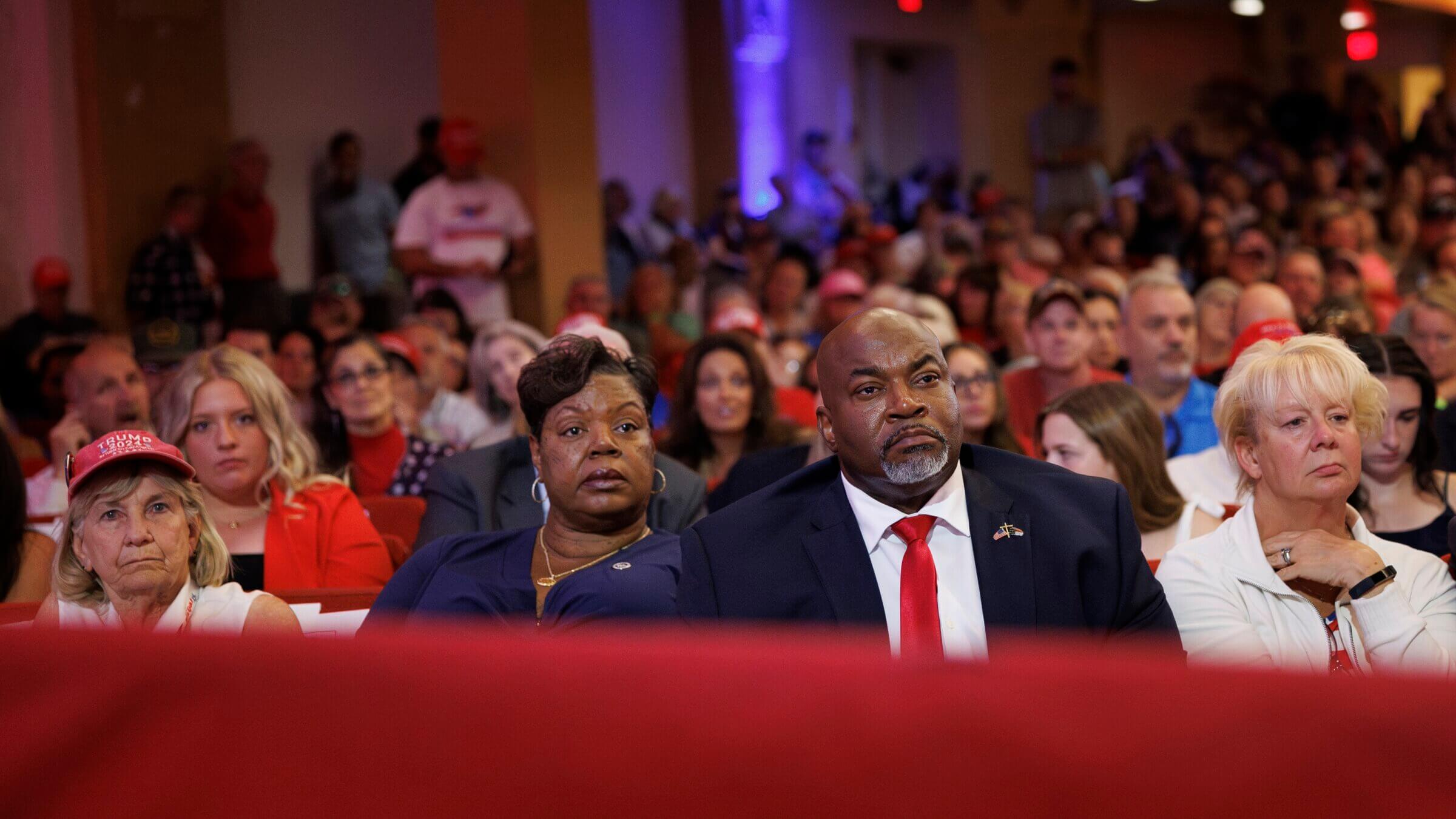Why antisemitic politicians pose a quandary for Jewish leaders
Some elected officials say offensive things about Jews even while supporting the policy priorities of major Jewish organizations

North Carolina Lt. Governor Mark Robinson sits with his wife, Yolanda Hill Robinson, during a campaign event for Republican presidential nominee Donald Trump in the state last month. Photo by Getty Images
“Antisemitism Notebook” is a weekly email newsletter from the Forward, sign-up here to receive the full newsletter in your inbox each Tuesday
It almost seems more difficult for Jews to figure out what to do with politicians who engage in obvious antisemitism — the stuff we pretty much all agree is bad — than those who criticize Israel in ways that some people consider antisemitic.
I was reminded of this after CNN revealed last week that North Carolina Lt. Gov. Mark Robinson, the state’s Republican candidate for governor, had spent years making offensive posts on a pornography website, including professing his preference for Adolf Hitler over Barack Obama and referring to himself as a “black NAZI!”
The shocking nature of the posts — again, made on a pornography forum — seems to have at least shamed Robinson’s senior campaign aides, several of whom resigned over the weekend, but the candidate himself has remained defiant and so far many Republicans are trying to avoid condemning him.
“Allegations aren’t necessarily reality,” said Sen. JD Vance, the Republican vice presidential candidate. “You have to let these things sometimes play out in the court of public opinion.”
And while Robinson — who has a long pattern of Holocaust denial and open hostility toward Jews — is an extreme case, and trailing badly in the polls, he’s not alone.
Take Rep. Paul Gosar, the Arizona Republican who has had close ties to antisemites, linking in his newsletter to an article about “Jewish warmongers” and employing staffers who run white supremacist social media accounts. He also partnered on fundraising and events with Nick Fuentes, the far-right leader who, like Robinson, often praises Hitler (and once dined with former President Donald Trump).
Or Rep. Marjorie Taylor Greene, the Georgia Republican who recently complained that a popular definition of antisemitism was unacceptable because it rejected the Christian “gospel” that Jews killed Jesus. She’s also spoken at a conference organized by Fuentes.
Jewish organizations have condemned all of these figures. But they have not received the kind of sustained opprobrium directed at leaders accused of antisemitism over their criticism of the war in Gaza and other Israeli policies.
For example, Democratic Reps. Jamaal Bowman and Cori Bush both faced campaigns warning voters in their districts that “antisemitism is on the ballot,” something Gosar and Greene have so far been spared.
Why does it seem like people sometimes mobilize less against explicit antisemitism — praising Hitler — than against anti-Zionism or, as I phrased it in last week’s newsletter, anti-Israelism?
One factor may be fear of impotence: Unsuccessfully campaigning to defeat Gosar or Greene on the basis that they are antisemitic might send the message that voters don’t care about antisemitism — and that your organization can’t make them care. It’s worth noting that AIPAC and Democratic Majority for Israel have basically given up trying to unseat Reps. Ilhan Omar and Rashida Tlaib, whose anti-Israel positions mirror those of Bowman and Bush but who don’t face the same electoral vulnerabilities in their districts.
But I think the bigger factor is about policy impact: To be crude, whatever Mark Robinson may wish, establishing a Fourth Reich in North Carolina is not really a viable political project. And more broadly — thankfully — legislation specifically targeting Jews for discrimination is basically nonexistent in the U.S. To the extent that the white supremacists Gosar is friendly with have influence on policy, it is on matters like promoting a crackdown on immigration, which is not viewed as an existential Jewish issue.
In contrast, Bowman staked out positions following Oct. 7 — opposition to Iron Dome funding, boycotting Israel and accusing the country of genocide — that caused many Jewish groups, led by AIPAC, to see him as a threat to what are often considered “Jewish” priorities in Congress. Bush similarly used her national bully pulpit to assail Israel.
This doesn’t break down entirely on partisan lines, either. Pro-Israel groups have targeted Rep. Thomas Massie, a conservative Kentucky Republican who has both used rhetoric invoking antisemitic tropes while also voting against funding for Israel and even Holocaust education.
But more common are folks like Robinson, who pose a quandary for Jewish leaders by making outrageously offensive comments about Jews while also supporting Israel and legislation to fight antisemitism. Robinson has never apologized for his past social media posts, including one that referred to an account of the Holocaust as “hogwash” and another that said a Jewish film director was trying to “pull the shekels out of your Schvartze pockets,” although he suggested they were poorly worded last October while declaring North Carolina Solidarity with Israel Week.
“There was never any antisemitism intended from those words,” Robinson said. “There is no antisemitism standing here in front of you today.”

















